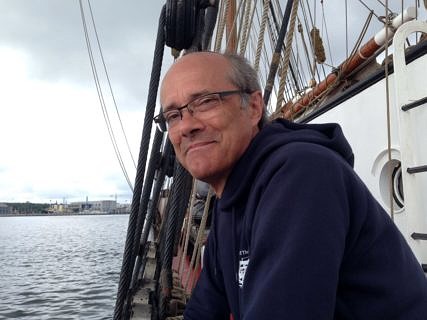International collaboration: all hands on deck!
Better known for modelling discrete-continuous optimisation problems than optimising points of sail, and far more comfortable on land discussing how to simulate gas flows than determining how to navigate open seas, Prof. Dr. Günter Leugering joined FAU in 2003 as Chair of Applied Mathematics II and became the university’s Vice President for International Affairs in 2015. He also led a team of five researchers representing The Chairs of Economics – Discrete Optimization – Mathematics (EDOM) and their international guests on leg 2 of Science Sets Sail this summer. We asked him why he decided to take part in Science Sets Sail.
With a long list of international collaborations – not to mention previously held university posts and visiting professor roles in wide a range of countries, why is international research in your field so important?
Prof. Leugering: As a representative of discrete and continuous optimisation on the ship, I can say that economies worldwide face similar challenges in the transportation of water, gas, oil, and other goods (maybe even supply chains). That’s why it’s important to raise international awareness of the important research done in this field at FAU. Collaboration is essential.
Science Sets Sail provides two clear opportunities to further international collaboration. Firstly, the voyage has enabled us to have discussions with internationally-renowned scientists on board. Secondly, we created a highly-visible way to share knowledge at our Open Ships Days, most importantly in Helsinki and Tallinn. Scientists from the universities located close to the harbours we visit on the voyage have shown considerable interest, realising the passionate and cutting-edge research that is conducted via international collaboration, and so triggering new potential collaborations.
Not to be under-estimated, we also confirmed our assumption that sharing scientific knowledge with the wider public is both of great importance, and very well received.
On Thor Heyerdahl, you’re representing not only your field of research also the university overall, in your role as Vice President for International Affairs. What do you think is the special benefit for university?
Prof. Leugering: In my dual role as active scientist and as VP, it is particularly important to bring together participating scientists from different disciplines. The team structure on a sailing ship enhanced this enormously, where you have to work together in areas where you have little (no!) expertise and in and environment where joint success relies on problem solving together: quite literally ‘All hands on deck’.
We noticed a strong relationship between mathematical optimisation and shape and topology optimisation in the context of 3D printing. For example, our guests Prof. Dr. Martin Berggren from Umea University and Prof. Dr. Jouni Partanen from Aalto University, initiated a promising collaboration to such an extent that we now plan mutual visits with FAU, with the goal of applying for EU funding.
We’ve also established an interest in collaborating at a University level with the various Finnish universities. In the case of University of Helsinki, we had a promising conversation during our Open Ship Day, when we were visited by the Chancellor and the Vice-Rector of Research and International Affairs.
Another overarching topic across the groups is machine learning, where there were also lively discussions in the mess hall between Prof. Dr. Ilan Shimshoni from University of Haifa, Prof. Dr. Heiko Tapken from University of Applied Science Osnabrück and myself. These conversations will continue also with Benjamin Groh from FAU’s Digital Sports Group.
From mathematician’s perspective, I had a strong interest in optimisation of wave guides, which I discussed with our guest Prof. Dr. Keijo Ruotsalainen from University of Oulu, and during the Open Ship Day with Prof. Dr. Sergei Nazarov from the Russian Academy of Sciences in St. Petersburg, and Prof. Dr. Jari Taskinen from University of Helsinki.
Senior officer and young researchers – how did the interaction work considering that in normal life you’re a member of the university board?
Prof. Leugering: Supporting young scientists is at any university professor’s heart, and in particular it’s my passion. This format gave me the unique opportunity to meet young FAU researchers away from my every-day routine, and in a casual but highly-focussed environment. In my experience during the past few days on this voyage, we had very open conversations, especially with our young researchers to better learn about their needs and how we can best support them with our university strategy and infrastructure so as not to clip their wings but give them the chance to create and innovate.
What unnecessary luxury made it into your luggage?
Prof. Leugering: Unfortunately, like several of my colleagues, my luggage didn’t catch up with me following flight delays until my last day of the trip!
Several days at sea, living and working at close quarters – dream come true, or a personal challenge?
Prof. Leugering: Both! I’ve loved this sailing experience. I enjoyed working on deck together with the crew and all my colleagues, and I am really pleased with the close relationship we established together once the work was done, over a beer or two, in discussions until the next watch begins. But, of course, the trip has had its challenging moments – especially when the wind is cold, and you have no luggage!
